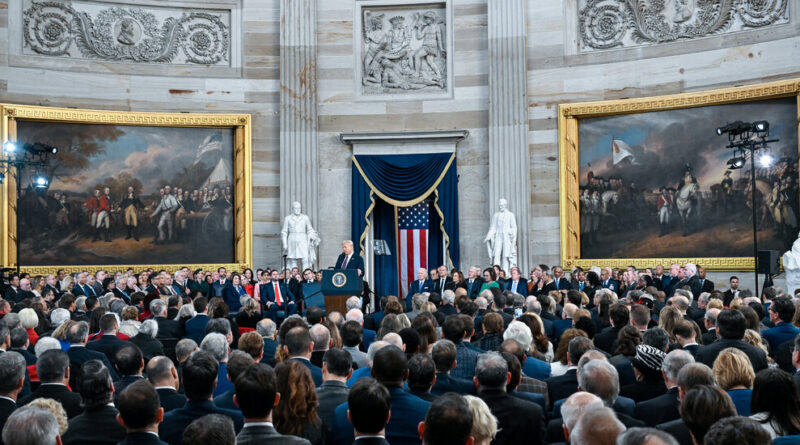Trump’s inaugural address centers on pledge to lift a country in ‘decline’
If his first Inaugural Address was a relentlessly dark vision of “American carnage,” President Trump made his second one a paean to the power of one person’s ability to rescue a nation — specifically his.
The 47th president’s 29-minute address on Monday, just after noon, painted an even bleaker portrait of a country in disarray, one seized by “years of a radical and corrupt establishment,” with the pillars of society “broken and seemingly in complete disrepair.” America, he said, “cannot manage even a simple crisis at home, while at the same time stumbling into a continuing catalog of catastrophic events abroad.”
It was a misleading and incomplete assessment of a country that has a growing economy, with falling inflation, slowing illegal immigration, a record-breaking stock market, the lowest levels of violent crime in years and a military that has limited engagement in conflicts around the world.
In that way, it was a speech that went to the core of Mr. Trump’s political appeal: convincing his supporters that he — and he alone — can fix what ails (or does not ail) the country. And it represented a reprisal of how he framed his first presidency — as a constant fight against enemies, foreign and domestic.
“My recent election is a mandate to completely and totally reverse a horrible betrayal and all of these many betrayals that have taken place and to give the people back their faith, their wealth, their democracy and, indeed, their freedom from this,” Mr. Trump said on Monday, in the longest inaugural address in modern history.
“America’s decline is over,” he declared.
Mr. Trump pledged that the country was entering a “golden age,” as evidenced by his own fate — noting that he emerged victorious in the face of political opposition, legal wrangling and even two attempts on his life.
“I felt then, and believe even more so now, that my life was saved for a reason. I was saved by God to make America great again,” he said, adding later: “As you see today, here I am. The American people have spoken.”
Mr. Trump’s delivery of his speech was more restrained than the ones he gives at his boisterous rallies. Instead of looking out at a crowd of supporters spread across the Washington Mall, the new president — citing frigid weather — delivered his address to a relatively small group of dignitaries inside the crowded Capitol Rotunda, where the sound of his voice echoed off the marble floor.
He read the speech from a teleprompter, with apparently few of his trademark, off-the-cuff departures. It was more businesslike than some of his angry rants, and more dutiful than his first address, almost as if to say: “I’ve explained all of this to you before.”
But in terms of the substance of his agenda, he did not pull his punches.
Mr. Trump invoked the Alien Enemies Act of 1798 in promising that he would “use the full and immense power of federal and state law enforcement” to go after violent immigrants and gangs. On trade and energy and inflation and gender rights and military might, he vowed no hesitation or moderation or compromise.
There will be only two genders in America, he said, male and female. There will be no preferences for electric vehicles. There will be no escape from tariffs for other countries. And there will be no misunderstanding when it comes to the mission of the military. The Panama Canal will be taken, with the implication that he will do so by force if necessary. And the Gulf of Mexico will be renamed the Gulf of America, he claimed.
The speech had echoes of the angry jeremiad that he delivered in his 2017 inaugural address, which was uncompromising in tone and contained few of the traditional grace notes.
Eight years ago, Mr. Trump described “mothers and children trapped in poverty in our inner cities,” “rusted-out factories scattered like tombstones across the landscape of our nation,” schools that teach students nothing, and “the crime and the gangs and the drugs that have stolen too many lives and robbed our country of so much unrealized potential.”
On Monday, he accused the government of “trying to socially engineer race and gender into every aspect of public and private life” and said his predecessor had overseen years of a “chronic disease epidemic.”
To the extent that Mr. Trump expressed hope eight years ago, it was the hope that he would succeed in advancing his agenda.
“America will start winning again, winning like never before,” he told the crowd assembled in front of the Capitol in 2017. “We will bring back our jobs. We will bring back our borders. We will bring back our wealth. And we will bring back our dreams.”
Monday’s inaugural address was more prescriptive and detailed as Mr. Trump ticked through a variety of policy goals that he said he intended to achieve. And it had moments of outreach which were missing the first time.
He cited Monday’s celebration of Martin Luther King Jr. Day as he promised to “strive together to make his dream a reality.” And he said that his “proudest legacy will be that of a peacemaker and unifier. That’s what I want to be, a peacemaker and a unifier.”
But, as he soon explained, that means unifying behind him.
“The entire nation is rapidly unifying behind our agenda,” he said on Monday, “with dramatic increases in support from virtually every element of our society, young and old, men and women, African Americans, Hispanic Americans, Asian Americans, urban, suburban, rural.”
He ended the thought where he often does, with a reflection on the power of his own election.
“Very importantly,” he said, “we had a powerful win in all seven swing states and the popular vote. We won by millions of people.”

